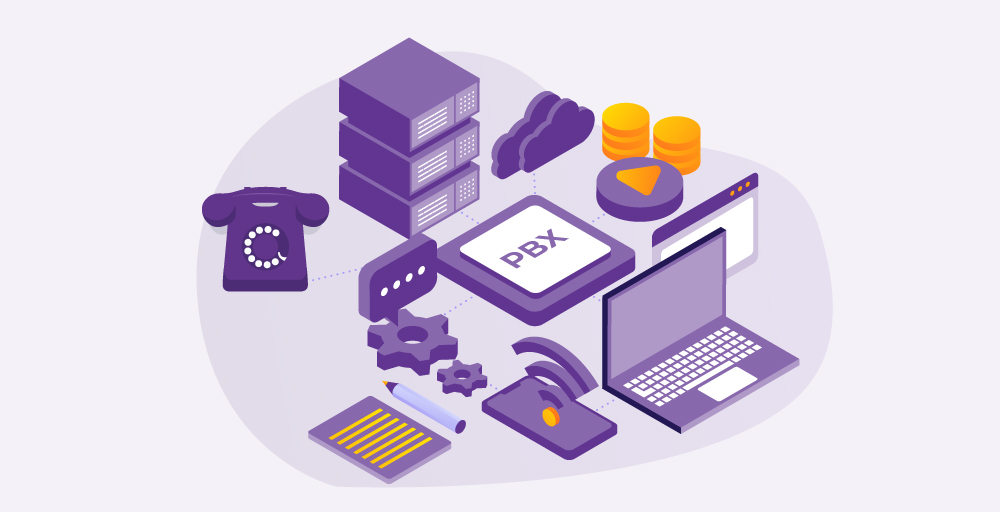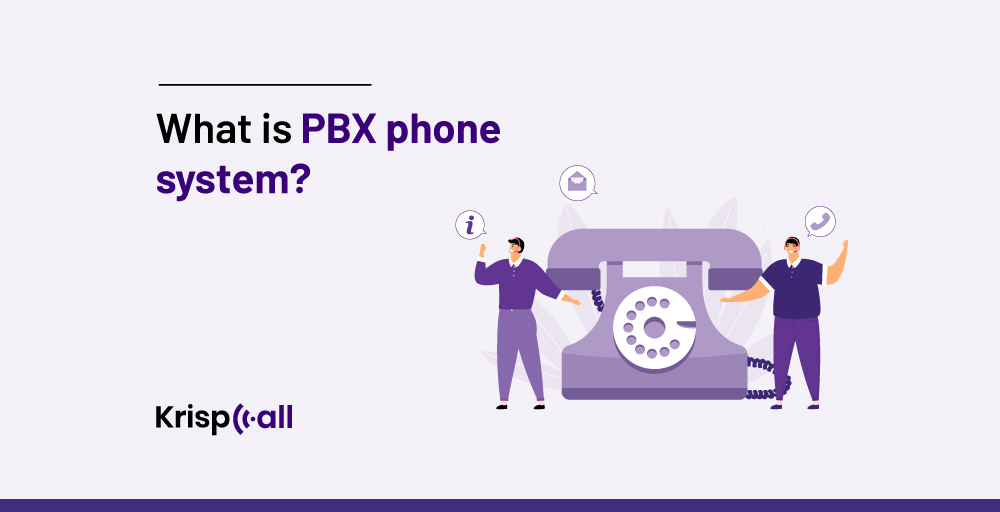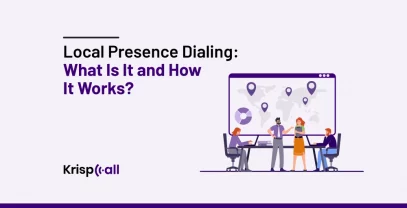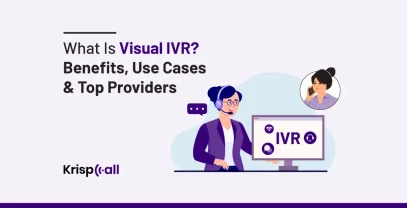Have you ever wondered🤔 how companies manage their phone calls efficiently and ensure every message gets through?
That’s because companies are increasingly adopting advanced PBXs that not only connect one phone to another but also ensure that every call is answered.
A PBX system offers advanced features such as call forwarding, voicemail, call transfer, and flexibility that provide businesses with cost-effective communication solutions.
In this article, we will learn in more detail information about the PBX phone system, its benefits, components, and office phone system.
🔑KEY HIGHLIGHTS
- A Private Branch Exchange (PBX) is an internal telephone network within a company that handles incoming and outgoing calls.
- Office phone system technology is a telephone system that manages inbound and outbound calls in a business environment.
- A PBX system comprises both hardware and software components, and each plays a vital role in maintaining smooth communication.
What is a PBX phone system?
A Private Branch Exchange (PBX) is an internal telephone network within a company that handles incoming call and outgoing call. This system enables people in an organization to make calls within the organization and on other external lines.

Previously business used traditional analog PBX system to communicate. A traditional analog PBX system is a telephone system that connects to all of your phone extensions using the public phone network via PSTN (Public Switched Telephone Network) or ISDN lines.
Traditional PBXs use proprietary phones that are typically incompatible with other systems. This leads to system lock-in, where switching systems means replacing all the phones or vendor lock-in. Here, the phones can only be used with systems from the same vendor, often within a specific range of products.
Meanwhile, technology has advanced, and now, Open-Standards-based IP PBX systems have changed the telephony landscape. These new systems use the internet to handle phone calls, making them more flexible and compatible with different devices.
What is Office Phone System Technology?
Office phone system technology is a telephone system that manages inbound and outbound calls in a business environment. It enables employees to easily communicate with their colleagues, customers, and business partners through various features that promote productivity and efficiency.
In the earlier phase, the PBX system only offered voice calling from one line to another but today systems offer many features, such as call transfer, call routing, Interactive voice response (IVR), and many more.
Business telephone systems have come a long way. Initially they used traditional landline phone systems to call each other with a phone that had to be connected to a wire and a proper desk phone. But today, PBX systems connect to modern SIP and IP phones, also known as VoIP systems. Users can use their office phone extension over the internet or through a mobile app.
Digital communication systems have advanced so much that they have overcome all the weaknesses of traditional landlines and developed new features for businesses. New features like unified communication, virtual assistance, automated attendants, call queuing and IVR are shaping the new future for PBX phone systems.
What are the Components of a PBX System?
The key components of a PBX system are PBX server hardware, extensions, trunk lines, IP phones, and software. Both hardware and software have their roles and responsibilities.
PBX hardware: It consists of several things, such as switches, servers, network infrastructure, Phone sets, Cables, and power supplies, each of which has its roles and responsibilities. These components are essential for the physical setup and maintenance of the PBX system, providing the necessary infrastructure for its operation.
software in PBX: On the other hand, software in PBX plays a crucial role in managing the internal part of the PBX phone system. It focuses on managing call conferencing, customer greeting, voice calls, call queues, and call management and provides various advanced options to improve customer service and increase agents’ call efficiency.
There are two types of PBX systems: traditional and cloud-based. Let’s take a look at it;
1. Traditional (hardware-based)
The traditional PBX system is a landline-based telephone system that completely relies on copper wire to function. A traditional PBX system depends on various hardware, such as switches, servers, copper wire, phone sets, etc. All this hardware has its job; for example, switches manage the calls within the system, while servers handle the switching of calls within the system and in and out of it.
The lines within the PBX system connect internal communication and incoming and outgoing calls, while phone sets are used for making and receiving calls. Finally, this PBX system connects all phone extensions and adds them to a public phone network via PSTN (Public Switched Telephone Network) or ISDN lines to connect your call to other phones.
2. Cloud-based (Virtual)
A cloud-based PBX system, also known as a virtual PBX system, is a phone system that allows callers to make and receive calls through the Internet rather than a physical wiring connection. With cloud-based PBX, you can call from anywhere without any physical boundaries. The only thing you have to look out for is the Internet.
Unlike traditional PBX phone systems, cloud-based phone systems offer a wide range of features, such as call forwarding, call barging, call recording, call analytics, auto attendants, and Integration with third-party tools. These features help you streamline your business and connect with anyone with proper internet access.
📚Also Read: Top 5 Reasons to Choose Cloud PBX for Business Success
What are the Benefits of the PBX system?
A PBX system offers a user various benefits; for example, it enhances customer experience, improves the overall communication between agents and customers, offers flexibility so businesses won’t have to stay in a particular location, and, lastly, the PBX system helps you control business overall communication.
Here are some detailed information about the benefits that the PBX system provides;
1. More Cost Saving
PBX phone system is cost-effective and far more affordable compared to traditional phone systems. The PBX system is a cost-saving solution as they do not rely on heavy, expensive equipment and only focus on serving through the internet.
In addition, the phone system is also maintained by a service provider, which further eliminates maintenance, making PBX a cost-effective phone system.
2. Improved Communication
A PBX system is a great way to improve communication between employees and clients. This system has advanced features such as call transfer, voicemails, and forwarding calls without hassle. These features make it easier to keep in touch with the team and clients as much as possible.
The best thing is that with PBX, you do not have to worry about missing important calls and messages, as you have a voicemail and IVR feature.
3. Enhanced Productivity
PBX systems can significantly boost the productivity of your business. Different features like call queuing and Interactive Voice Response (IVR) to minimize missed calls. Similarly, automated attendants manage your routine task which allows you and your team to focus more on other important tasks and also reduces wait times for customers.
4. Professional Image
One of the benefits of having a PBX system is that your business will appear professional and well-organized. As they handle calls and answer them professionally, your business will have a
good first impression among clients and customers.
This makes the perception that your business is well-managed and that you have everything under control.
5. Centralized Control
PBX allows you to control your entire company’s communication system. This means you can manage all your phone lines, extensions, and features from one easy-to-use dashboard. This setup makes administration simple and efficient. You can easily monitor call activity, add new users, and adjust settings without technical expertise.
6. Delivers More Reliability
On-premises PBX systems do not rely on an internet connection to function, making them highly reliable even in areas with poor or unreliable internet service. This makes them a good choice for businesses in rural locations or areas with unstable internet infrastructure.
Many on-premises PBX systems offer an optional uninterruptible power supply (UPS). This ensures that companies can maintain open lines of communication during a power outage or other emergency that could disrupt other forms of communication.
7. Is Secure
We all know that keeping communication secure and maintaining client information private is important. But with the PBX feature, you can easily connect with customers without worrying about information getting hacked.
PBX systems offer strong security that protects various important business data. This system uses encryption to protect your calls and data from unauthorized access and hacking attempts. Also, this capability allows only the authorized person to access the information.
8. Has Integration Capabilities
PBX systems, especially the ones provided by hosted PBX providers, also have the tendency to integrate smoothly with other business tools and software. As a result, users can enjoy a unified communication experience across different platforms. You can connect your phone system with CRM software, email, and other productivity tools.
This integration streamlines operations and improves workflow efficiency by reducing the need for manual data entry. This way, your team can focus on their tasks without switching between different systems.
Conclusion
Choosing the right phone system is crucial for any organization, no matter its size and/or the type of business it deals with. PBX phone systems are one the best choices for any business type as they offer various features that can enhance communication, improve productivity, and save costs.
Whether you are a small business or a big company, a PBX system is efficient and effective that will help your business communications meet its requirements. With PBX, you can ensure that your team stays connected, your clients are satisfied, and your business operates smoothly.
FAQs
What is PBX phone system software?
The software of the PBX phone systems is a vital aspect of a Private Branch Exchange (PBX) system that controls the distribution of the calls within the organization. This software allows the users of the software to convey messages internally and externally through different communication media such as VoIP, ISDN, or analog. It offers services like transfer calls, voicemail, record calls, IVM, and call centers.
What is PBX phone system vs VoIO?
PBX is a business phone system that connects all office desk phones and allows companies to make internal calls for free and external calls through PSTN (Publicly Switched Telephone Network). On the other hand, VoIP (Voice over Internet Protocol) is a technology that enables voice communication over the Internet instead of traditional phone lines.
How much does small business cloud PBX software cost?
The average cloud PBX phone system service ranges between $20 to $60 use per month. However, it can vary depending on the features and the services used by the small business.





